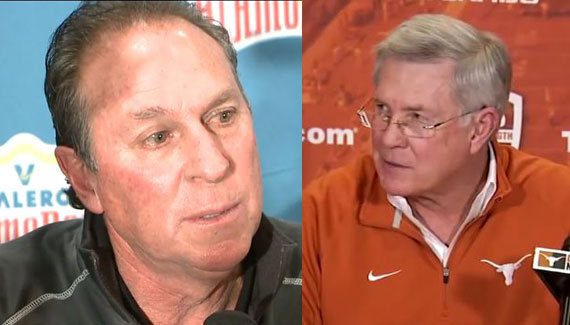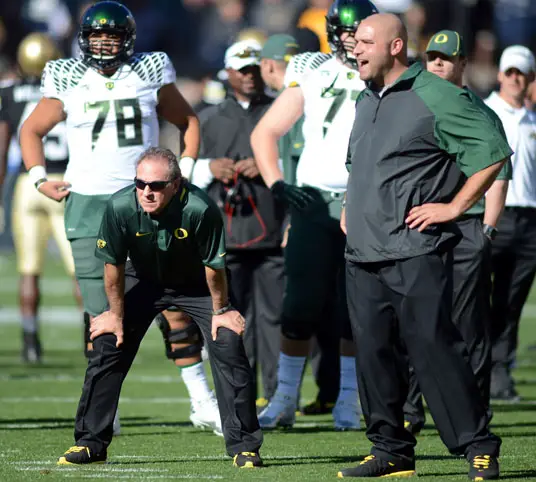Knowing the right time to leave is a sign of a professional, and at the same time is never an easy task. No one wants to walk away when they are up, hoping to sustain those highs as long as possible. Conversely, no one wants to walk away when they are down, always assuming that their fortunes will reverse and they will ascend to the top once again. Amongst those who have the hardest time knowing when to leave at the most opportune time have been coaches.
Tonight’s Alamo Bowl will be the final game for two prominent coaches involved – Oregon Defensive Coordinator Nick Aliotti and Texas Head Coach Mack Brown – although they are leaving their respective schools under very different circumstances. While Aliotti’s departure was very sudden in the public eyes, and met with heavy hearts within the walls of the athletic department, Mack Brown’s exit was so Brown will undoubtedly be recalled more in the national memory of the two coaches.
Inevitability, it is solely a product of their circumstances: one was a coach who won a National Championship with the biggest football program in the country’s most football-crazed state, while the other was a coordinator at a west coast program. Even as their careers end, most media outlets have painted Brown with the “Gipper” brush, devoting endless discussion to players winning his final game for him. This is a great narrative, except for one problem: It’s not true.
“We played for us, not him.” – Case McCoy, on playing in possibly Mack Brown’s final season #HookEm
— Justin Wells (@justinwells2424) December 8, 2013
Those hardly sound like the words of a player for whom the coach’s exit has any bearing on his motivation to win. Compare those to the words uttered by Oregon’s players upon news of Aliotti’s retirement:
Taylor Hart said Nick Aliotti is “like a second father to me.” Aliotti kind of looked up and shook his head. Visibly emotional. #GoDucks
— Jake Zivin (@JakeZivin) December 27, 2013
Avery Patterson, who shares hometowns with Nick Aliotti, said Aliotti means everything to him and he doesn’t know where he’d be without him.
— Chris Brooklier (@ChrisBrooklier) December 28, 2013
Oregon Ducks football: Tyler Johnstone on Nick Aliotti — “I watch his interviews like a fan.” (video) http://t.co/1oPJbrjda5 #goducks
— oregonlive.com/ducks (@oregonliveducks) December 28, 2013
In an article written by The Oregonian‘s Jason Quick, shortly after announcing his retirement, Aliotti sounded like a man with few regrets about his decision, though he did sound forlorn on the topic of having never been a head coach:
“I won’t say there is regret, but it would have been nice to try that, and lead your own team, have your own guys,” he said.
It is unfortunate that Aliotti never had that chance, given the relationship his players have spoken about and the innovations he made as a coordinator in recent years. His high-risk, high-reward style with multiple substitution sets, that may prove to be ahead of his time should the current brand of up-tempo football remain popular. Yet Aliotti has insight into possibly why he never became a head coach:
“I like the X’s and O’s, and I like being with the kids, and I like rolling up my sleeves, and I like the coaching,” Aliotti said. “I’m not a politician … I’m not a schmoozer … I’m not a brownnoser. I am who I am; I say what I feel and sometimes people don’t like it.”
Aliotti’s choice of the word “politician” is fascinating, since that is the word that has been used to best describe the man leading the team he is tasked with stopping tonight, Mack Brown. (Sports Illustrated‘s Andy Staples called him, “perhaps the best politician to ever coach a football game.”) Brown’s politicking was always evident, never more so than when he convinced the BCS into letting Texas into the 2005 Rose Bowl. His skills as a politician made him a highly effective recruiter, allowing him to rebuild a Texas program, and landing stars, most notably Vince Young, that helped him win games and titles that helped restore Texas football to national prominence.
But for all the success he has enjoyed as the commander of talented athletes, Brown’s skills as an X’s and O’s coach was suspect. He has no coaching fruit of significance, astoundingly, given the visibility of his program and the length of his tenure there. His most notable former assistants who became head coaches are Gene Chizik and Will Muschamp, two coaches best known for appearing comically overmatched for the high-profile jobs they held. Compare Brown’s coaching fruit to that of his long-time conference rival, former Texas Tech and current Washington State head coach Mike Leach, whose 2000 team had six current FBS head coaches (including Art Briles, Sonny Dykes, Dana Holgorsen, Ruffin McNeill, and starting quarterback Kliff Kingsbury) – nearly 5% of all the top jobs in college football, were a part of Leach’s team that season.
Still, Brown’s Longhorns won four more conference games than Leach’s team did on the strength of the talent Brown recruited. That success was sustained for as long as he and his staff hit on recruiting, but once star talent was incorrectly evaluated, Brown demonstrated a lack of ability to encourage any improvements. He had previously convinced everyone that Texas was an elite program, but those kind of programs don’t lose four-plus games per year for four straight seasons. Like all politicians, his favorability with those he made promises to could only last as long as he delivered on them.
In that regard, maybe it’s best that Nick Aliotti was never a head coach. He never had to deal with the ugly farewell that plagues nearly all great coaches. Instead, he gets to leave being loved by both his fellow coaches and players; players that love him enough to express their sadness publicly, as they see him go. For Mack Brown, his players couldn’t care less; best symbolized by his own starting quarterback publicly vocalizing that very sentiment in a very casual manner. There are plenty of reasons for players to find motivation to win, and the reasons are vast for why many of them will play their hearts out tonight regardless of their coach’s future. But if the argument is to be made about a team winning a last game for its coach, the smart pick will be on the team that will actually be sad to see him go.
Top photo from screengrabs of video provided by KEZI and the Texas Longhorns.
Related Articles:
Chip Kelly Update: Everything's Good Again ...
Chip Kelly Update: Wailing and Gnashing of Teeth
Shock and Awe -- The Oregon Ducks' Football Hangover Effect
Despite Lopsided Score, Georgia State "Never Stopped Believing"
Hope Springs Eternal for Ducks
Incompetent Pac-12 Officials: How Do You Miss ALL of THIS?
Nathan Roholt is a senior writer and managing editor emeritus for FishDuck. Follow him on Twitter @nathanroholt. Send questions/feedback/hatemail to nroholtfd@gmail.com.



